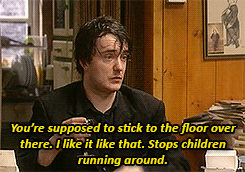My encounters with my sewing machine often have me tempted to throw it off a damn cliff. At the moment, it is not operational as it has a broken needle and it has had that broken needle for over two years now. Note to self, must find the spare needles to replace the broken needle.
It hasn’t been entirely out of operation the whole time I’ve
had it. It’s done a bit of mending, it started making a dress that took me over
a year to finish (on someone else’s machine), I’ve even made a quilt with it,
though I’m pretty sure the recipient of that quilt had to make some “minor”
adjustments so it would behave like a quilt because I didn’t actually know how
to make a quilt when I did it. I still don’t know how to make a quilt.
Sewing was one of our subjects at school under the title of
“Home Economics”. It’s funny because people are quite happy for life skills
like cooking and sewing to be in the curriculum but reckon that budgeting and
money management skills should be left up to the parents to teach and once upon
a time budgeting and money management skills were taught but such time has
passed since then that everyone has forgotten that fact.
I enjoyed sewing at school as mum was too petrified to let
me near her machine (even though I was never tempted to throw mum’s machine off
a cliff). We learned how to sew a zip, how to applique, tricks to hide our
bodgy stitching. When I got to Charles Campbell Secondary in year 9/10 I
continued to do sewing as a subject. I found a really pretty satin I planned on
using to sew my project boxer shorts with but when it came to the crunch I
didn’t have enough faith in myself to do a good job and used random cotton
fabric the school supplied instead.
Sewing is a pretty useful skill. Some friends of mine are
awesome sewers and some have even made things to sell at the markets. I used to
love seeing what Sylvia Majentic would wear to the Katherine Races every year
just to see what fabulous things she had made for the occasion. So why is it
the majority of us don’t bother with sewing anymore?
Most people who cop a rip in their clothes turf them out,
I’m usually no exception. However, what I do throw out gets a second life as a workshop
rag first. Another friend of mine sews in patches of patterned fabric into her
family’s ripped clothes when she mends them and it looks pretty cool.
We can’t rule out hand-sewing though. When I mend this is
usually how I get it done. Especially when I used to mend my horses’ blanket
after she’d shred it on the fence. Below is an example of a hand-sewn
stitch to try on the next thing to mend. And remember how, in a previous
blog, I talked about budgeting and spending on only essentials? If you think
you’ll use it heaps, invest in a sewing machine. Prices range from $150 to
$1000. Otherwise, a little sewing kit can be bought from a cheapo store for
about $5.
A stitch guide can be found here at Homespun.net.au
 |
| A basic sewing kit manufactured by Habee Savers. The scissors are useless FYI. |
 |
| An over stitch/whip stitch ended with a French knot to repair the hole in my sock. |








